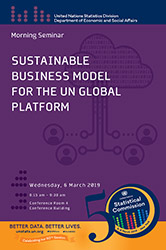United Nations Statistical Commission
Overview 50th Session (2019) Side Events
Sustainable Business Model for the
UN Global Platform
- Wednesday, 6 MAR 2019
- 8:15 – 9:30 am
- Conference Room 4
Meeting organized by UNSD and ONS, UK
Purpose
The objective of this side event is to provide explanation to and have a discussion on the background document of the UN Global Working Group on Big Data to Official Statistics regarding the longer term vision for the UN Global Platform as the collaborative environment for the global statistical community to develop and test new data sources and new methods using new technologies for official statistics. In particular, the question is raised if the UN Global Platform could become an institute for the global statistical community.
- Chair:
- Ms. Sylvie Michaud, Statistics Canada
- Panellists:
- Mr. Mark Craddock, ONS, UK
- Mr. Ronald Jansen, UNSD
- Mr. Yusuf Murangwa, NISR, Rwanda
- Ms. Gemma Van Halderen, UNESCAP
- Mr. Sumair Sayani, Nielsen & Demand Institute
Panel
Background
The Global Working Group (GWG) on Big Data for official statistics was established by the United Nations Statistical Commission in March 2014. The GWG is an intergovernmental body consisting of 28 member states and 16 international organizations, and is currently co-chaired by the UK and Denmark. The GWG was mandated to provide strategic vision, direction and coordination of a global programme using new data sources and new technologies for official statistics, including indicators for the 2030 Agenda for Sustainable Development.
The GWG organized several international conferences in Asia (Beijing and Abu Dhabi), Europe (Dublin) and South America (Bogota) at which GWG members and others could showcase the use of new data sources, such as satellite, mobile phone, social media and scanner data, for official statistics. All of those pilot projects were designed and executed on a one-off and stand-alone basis, which could not be shared with others. In other words, new data sources could not be shared and new methods and algorithms could not be peer-tested. Knowledge sharing was limited to presentations and papers.
To take the next step, the GWG saw the need for a platform, on which researchers can share ideas and work together on projects; and on which GWG members can collaboratively develop trusted data, trusted methods and trusted learning in trusted partnerships with the other government agencies, private sector, academia, civil society and other stakeholders. Such collaboration will encourage best practice across public and private data initiatives. The exchange of ideas will drive innovation in compiling official statistics including transparent global data sets and peer-tested methods and algorithms.
The so-called "fourth industrial revolution" is accelerating the technological advancement in the areas from the Internet of things, to automation and robotics, to artificial intelligence (AI), to nanotechnology, to biotechnology. With the digitization of the information and communications technologies and the rise of virtual communities across the world, Big Data is emerging as an important opportunity for evidence-based policy making. Big Data are generated via social media, cellular phones, satellite images, sensors, online transactions, crowdsourcing and trails of internet searches. They can reveal important insights and patterns of human experiences with significant implications for sustainable development processes. Big Data can improve timeliness and granularity of data for policy making, which is especially relevant to reach those most in need.
The global statistical community agreed in 2017 on the Cape Town Global Action Plan for Sustainable Development Data, which calls for action under six strategic areas: coordination and strategic leadership on data; innovation and modernization of national statistical systems; strengthening basic statistical activities and programmes; improving the dissemination and use of data; building multi-stakeholder partnerships; mobilizing resources and coordinating efforts for statistical capacity building. The UN Global Platform is a response to this call for action; building on the underpinning principle of sharing data for the public good in a way which leaves no one behind.
The UN Global Platform is a collaborative research and development environment for the global statistical community. It offers technology infrastructure for data innovation across the community of official statistics. It currently contains a number of alpha services such Alibaba Cloud, Amazon Web Services, Google Cloud Platform and Microsoft’s Azure Cloud, combined with a number of other services for code collaboration, methods publishing, earth observation and location data analysis. Users of the platform can search, build, deploy and consume algorithms and statistical methods, and can further develop methods using the main programming languages used by the community (R, Python, Java, and Scala).
The platform also hosts machine learning models and publish API endpoints to these. Partners on the platform from around the globe can make use of the algorithms from their own environments by calling the APIs. They will also have access to a number of global datasets, such as high resolution commercial satellite imagery data, the ADS-B flight data dating back to July 2016 and AIS shipping data. The innovate–leverage–commoditize (ILC) lifecycle is at the heart of the R&D collaboration on the UN Global Platform.
